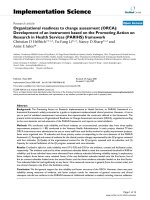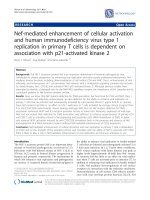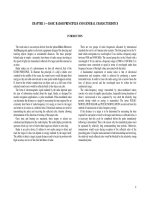Lecture Conducting and reading research in health and human performance (4/e): Chapter 1 - Ted A. Baumgartner, Larry D. Hensley
Bạn đang xem bản rút gọn của tài liệu. Xem và tải ngay bản đầy đủ của tài liệu tại đây (971.56 KB, 25 trang )
����������������������������������������������������������������������������������������������������������������������������������������������������������������������������������������������������������������������������������������������������������������������������������������������������������������������������������������������������������������������������������������������������������������������������������������������������������������������������������������������������������������������������������������������������������������������������������������������������������������������������������������������������������������������������������������������������������������������������������������������������������������������������������������������������������������������������������������������������������������������������������������������������������������������������������������������������������������������������������������������������������������������������������������������������������������������������������������������������������������������������������������������������������������������������������������������������������������������������������������������������������������������������������������������������������������������������������������������������������������������������������������������������������������������������������������������������������������������������������������������������������������������������������������������������������������������������������������������������������������������������������������������������������������������������������������������������������������������������������������������������������������������������������������������������������������������������������������������������������������������������������������������������������������������������������������������������������������������������������������������������������������������������������������������������������������������������������������������������������������������������������������������������������������������������������������������������������������������������������������������������������������������������������������������������������������������������������������������������������������������������������������������������������������������������������������������������������������������������������������������������������������������������������������������������������������������������������������������������������������������������������������������������������������������������������������������������������������������������������������������������������������������������������������������������������������������������������������������������������������������������������������������������������������������������������������������������������������������������������������������������������������������������������������������������������������������������������������������������������������������������������������������������������������������������������������������������������������������������������������������������������������������������������������������������������������������������������������������������������������������������������������������������������������������������������������������������������������������������������������������������������������������������������������������������������������������������������������������������������������������������������������������������������������������������������������������������������������������������������������������������������������������������������������������������������������������������������������������������������������������������������������������������������������������������������������������������������������������������������������������������������������������������������������������������������������������������������������������������������������������������������������������������������������������������������������������������������������������������������������������������������������ous research categories are
mutually exclusive
Basic Research
Purpose is to discover new or fundamental
knowledge
Practical application is NOT a goal
Usually in highly controlled laboratory settings
Applied Research
Purpose is to find answers to practical problems
Practical in nature . . . most common in HHP
Inferences or generalizations are made to the
intended population
Action Research
– similar to applied research except in a local setting
– very pragmatic and less controlled
– no interest in generalizing findings
Quantitative Research
Positivist paradigm
Traditional model of research
Hypothesis directed
Based on empirical evidence
Measured with numbers
Analyzed statistically
Seeking generalizations
Qualitative Research
Naturalistic paradigm
Descriptive in nature
Reliance on qualitative, non-numerical data
More subjective approach
Variety of methodologies
– in depth interviews
– direct observation
Situational specific … little generalizability
Experimental Research
The purpose of experimental research is to
investigate cause-and-effect relationships by
manipulating certain variables to determine
their effect on another variable
–
–
–
–
–
–
attempts to establish causality
manipulation of independent variable
control of extraneous variables is vital
often uses a control group
often uses randomization procedures
major limitation is often unnatural environment, thus
limiting generalizability
Non-Experimental Research
Tends to observe, analyze, and describe what
exists rather than manipulating the variable
under study
Lack of control is often cited as a limitation
Various types common in HHP
–
–
–
–
Causal-comparative
Descriptive
Correlational
Historical
Casual-Comparative Research
Seeks to investigate cause-and-effect
relationships similar to experimental research
However, researcher cannot manipulate the
independent variable because it is something
the subject already has
– Attribute or organismic variable
Gender
Ethnicity
Medical condition
Also called “ex post facto” research
Descriptive Research
Seeks to describe specific phenomena or
characteristics of a particular group of subjects
– Answers the question “what is”
– No manipulation of an independent variable
Wide range of methodologies
–
–
–
–
Surveys
Direct measurement
Observation
Interviews
Correlational Research
Seeks to determine whether, and to what extent,
a relationship exists between two or more
variables
– No manipulation of an independent variable
– May be descriptive or predictive in nature
Cannot establish causality
Historical Research
Seeks to explore events and information from the
past in order to provide a better understanding of
the present with implications for the future
– Answers the question “what was”
Limited to synthesis and interpretation of data
that already exists
– Primary sources
– Secondary sources









